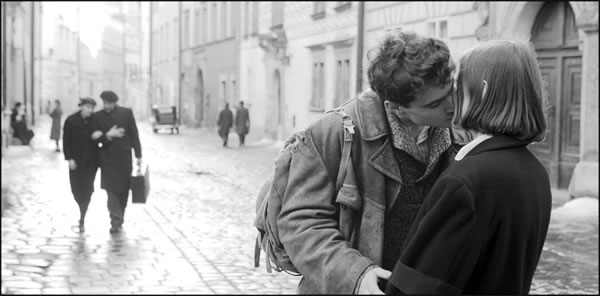By Leonard Quart
The festival’s diverse scope of international cinema
Begun in 2002 as an effort to revitalize Lower Manhattan in the wake of 9/11, the Tribeca Film Festival was founded by New Yorkers Robert De Niro, Jane Rosenthal, and Craig Hatkoff. The Festival’s success has benefited local inhabitants and businesses as well as the city as a whole, and has also been a channel for positive links with foreign countries via the arts.
This platform for interaction with the rest of the world is exemplified by the large number of European narrative and documentary films premiered each year. Peter Scarlet, the festival’s cinematically erudite executive director, would prefer to see still more screened. Scarlet believes that if there isn’t an audience in New York for world cinema, there is nowhere else in this country these films can be shown.
Among the international films being screened are ones by the great octogenarian Polish director Andrzej Wajda (“Ashes and Diamonds”), by an up-and-coming British realist director Shane Meadows (“This is England”), and the debut film of French photographer Delphine Kreuter.
When asked which of this year’s European films he would especially tout, Scarlet replies that the superlative film is from France: “The Secret of the Grain,” written and directed by Abdellatif Kechiche. The feature won César awards in France for best picture and best director for its richly detailed depiction of a family of Tunisian immigrants who have settled in a decaying port town in southern France. Conveying a strong sense of a family dynamic and its accompanying pressures, the movie draws compelling portraits of two individuals—an elderly man who works on the docks and an adolescent girl. Kechiche uses many extreme close-ups and long takes, and the picture’s ambiguous conclusion packs a powerful emotional punch.
Scarlet also recommends Andrzej Wajda’s “Katyn,” nominated for a 2007 Academy Award for best foreign language film. According to Scarlet, it addresses “one of the great open wounds of Polish history.” For years, the 1940 massacre of almost 15,000 captured Polish officers by the Red Army (under Stalin’s orders) had been shrouded in silence. Wajda’s own father—a cavalry captain—was one of the victims, many of whom were members of the Polish intelligentsia. At a recent screening of Wajda’s uncompromising account of the tragic event, the audience, largely comprised of the city’s Polish-American elite, was profoundly moved. Especially overpowering are the final 20 minutes, which exhaustively detail the massacre.
Another film deemed noteworthy is “The Aquarium,” directed by Yousry Nasrallah, which deals with social, sexual, and political repression in modern-day Egypt. Nasrallah has been working as a director and film critic for close to 30 years, and in this film he filters an often meticulous documentation of Cairo’s reality through a highly stylized, theatrical approach. In its critique of Islamist fundamentalism and the ruling regime’s corruption, the film, according to Scarlet, possesses an oblique style reminiscent of the Czech films like Milos Forman’s “Firemen’s Ball ”that criticized the Communist Party in the sixties.
French photographer Delphine Kreuter’s satirical “57,000 Kilometers Between Us” centers around an unhappy teenage girl, Nat, and her dysfunctional family—including an absurd, passive-aggressive stepfather who continually records the family’s supposedly perfect life online, and a biological father she loves who is now a transsexual living with a man. Nat seeks escape from her chaotic life by communicating through webcams, chats, and websites, wandering about in both real and virtual worlds. Adding to the disorder is a comic/pathetic figure portrayed by the brilliant Mathieu Amalric.
Scarlet mentions a final film, Antonello Grimaldi’s “Quiet Chaos,” written by and starring the gifted Italian director Nanni Moretti (“The Son’s Room”). A commercial and critical hit in Italy, the movie tells the story of a television executive struggling to come to terms with the death of his wife.
The Festival is running a second season of its Restored/Rediscovered selection of films like Fellini’s “Toby Dammit” and Rene Clair’s silent, almost-forgotten comic gem, “The Two Souls.” “Toby Dammit” represents the final—and by far strongest—episode in a 1968 compendium of macabre Edgar Allan Poe stories entitled “Spirits of the Dead.” The 40-minute film has been beautifully restored and Fellini’s delirious imagery and extreme stylization exhilarates. Clair’s elegant movie is accompanied by a new score, which will be played by the NYU Chamber Orchestra, and seen with French inter-titles and live English translation.
The films highlighted here represent only a fraction of the European and international films on display. With each passing year, the Tribeca Film Festival becomes more selective, wide-ranging, and venturesome in its programming, and that is cause for celebration.




































